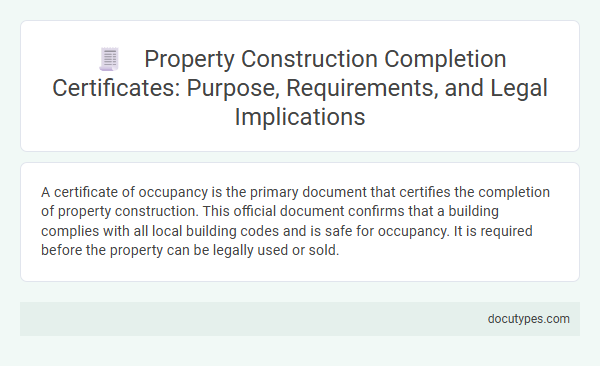A certificate of occupancy is the primary document that certifies the completion of property construction. This official document confirms that a building complies with all local building codes and is safe for occupancy. It is required before the property can be legally used or sold.
Introduction to Property Construction Completion Certificates
The completion of property construction is officially certified through a Completion Certificate (CC). This document confirms that the building has been constructed as per the approved plans and complies with local building regulations.
A Completion Certificate is typically issued by the local municipal authority or building department after a thorough inspection. It serves as legal proof that the property is safe for occupancy and meets all regulatory standards.
Definition and Overview of Completion Certificates
A Completion Certificate is a legal document issued by a local government agency or building authority confirming that a property's construction complies with approved plans and regulations. This certificate ensures Your building is safe, habitable, and has met all necessary construction standards.
- Definition - A Completion Certificate verifies that the construction of a property is finished according to approved building codes and permits.
- Purpose - It confirms that the property is safe for occupancy and adheres to all regulatory requirements.
- Issuance - Local authorities or municipal building departments issue this document after thorough inspection and approval of the completed construction.
Purpose of a Construction Completion Certificate
A Construction Completion Certificate is an official document certifying that a property has been built according to approved plans and regulations. It serves as proof that the construction work meets safety and quality standards required by local authorities.
- Verification - Confirms that construction complies with building codes and permits.
- Approval - Grants legal authorization to occupy or use the property.
- Documentation - Provides formal evidence for property transactions and insurance purposes.
This certificate is essential for ensuring the legality and structural integrity of the completed property.
Key Legal Requirements for Issuance
The document that certifies the completion of property construction is commonly known as the Certificate of Occupancy or Completion. This certificate confirms that the building complies with all legal and safety standards required for occupancy.
- Building Inspection - A thorough inspection by local authorities ensures your property meets all structural and safety regulations.
- Compliance with Zoning Laws - The construction must adhere to zoning codes and land use policies established by the municipality.
- Submission of Required Documents - You must provide all necessary permits, engineering reports, and compliance certificates before issuance.
Step-by-Step Process to Obtain the Certificate
The document that certifies the completion of property construction is known as the Certificate of Completion (CoC). This certificate verifies that the building complies with all regulatory and safety standards required by local authorities. Obtaining the CoC is essential before you can legally occupy or sell the property.
The step-by-step process to obtain the Certificate of Completion begins with submitting a completion application to the local building authority. Next, inspections are conducted to ensure the construction adheres to approved plans and building codes. After passing all inspections, the Certificate of Completion is issued, authorizing the use of the property.
You must prepare all required documentation such as architectural plans, permits, and inspection reports before applying. Maintaining clear communication with local authorities throughout the process helps prevent delays. Securing the Certificate of Completion provides legal assurance that the property construction meets all necessary standards.
Essential Documentation Needed
What type of document certifies completion of property construction? The primary document is the Completion Certificate (CC), issued by the local municipal authority after verifying that the property meets all regulatory standards. This certificate is essential for legal possession and future property transactions.
Authorities Responsible for Issuing Certificates
The Certificate of Completion for property construction is typically issued by local building authorities or municipal corporations. These authorities ensure that the construction complies with approved plans, safety standards, and zoning regulations before granting the certificate. Obtaining this document is essential for legal occupancy and property registration purposes.
Legal Implications of Non-Compliance
The document that certifies the completion of property construction is commonly known as the Certificate of Completion or Occupancy Certificate. This legal paper confirms that the building meets all regulatory standards and is safe for occupancy.
Non-compliance with obtaining this certificate can result in significant legal consequences, including fines and forced cessation of building use. Property owners may face challenges in selling or insuring the property without this document. Authorities can also impose penalties or demand demolition if the construction violates building codes or safety regulations.
Impact on Property Registration and Transfer
The document that certifies the completion of property construction is commonly known as the Certificate of Occupancy or Completion Certificate. This certificate confirms that the building complies with all local building codes and regulations.
Its impact on property registration is significant, as authorities require this document to verify that the construction meets legal standards before registering the property. Without this certificate, your property transfer process can be delayed or even denied, affecting ownership rights and marketability.
What Type of Document Certifies Completion of Property Construction? Infographic

